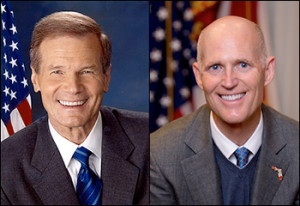By Jim Ellis
Aug. 1, 2018 — Another new poll was released yesterday on the Florida Senate race, and the data provides us an in-depth look at where each candidate is strong.For more than a year, three-term Sen. Bill Nelson (D) and two-term Gov. Rick Scott (R) have traded the polling lead — from the time it became evident that the latter man, ineligible to seek re-election to his own statewide office, would initiate a challenge for the federal position.
Mason-Dixon Polling & Strategy pre-released their new Senate survey results (July 24-25; 625 likely Florida voters) after publicizing their gubernatorial primary data last week. According to their conclusions, Gov. Scott has a 47-44 percent lead over Sen. Nelson. While the two candidates have repeatedly superseded each other in various public surveys, the two have almost always been separated within the polling margin of error.
This is the fourth time since February of 2017 that Mason-Dixon has conducted a Florida Senate poll. But, this is the first where Gov. Scott has led. In their other surveys (Feb 2017, October 2017, February 2018, and the current July 2018), Sen. Nelson held an edge of five points (46-41 percent; Feb 2017) and a margin of one (45-44 percent; February 2018), or the two were tied (44-44 percent; October 2017). As you can see, in all four polls the two men are both in the 40s, with none ever commanding majority support. The current poll is no exception.
Interestingly, while a stark Florida gender gap was previously detected it has widened in this latest poll. In the February 2018 poll, Gov. Scott held a strong 52-39 percent margin among men, while Sen. Nelson led 51-37 percent among women. This detected gender polarization is actually expanding. In the current M-D data, Scott’s advantage within the male sector has increased to 55-34 percent, while Nelson’s female support has also slightly grown (a net of one percentage point to 54-39 percent). Though Republicans generally do better among men while Democrats attract more support from women, seeing a heightened aggregate spread of 36 points (Scott plus-21 among men; Nelson plus-15 among women) is somewhat unusual.
Extreme polarization in the party support category is also present. Among Democrats, Nelson’s advantage is 80-12 percent. Conversely, Scott leads among Republicans, 84-7 percent. The Independents swing 47-43 percent in the governor’s favor, which is opposite of the national trend. So far this year, Democrats have enjoyed much better support among Independent and unaffiliated voters than Republicans.
Both men are also virtually universally known. Gov. Scott’s total name identification is 97 percent, while Sen. Nelson’s recognition factor is 93 percent. The governor’s favorability index is 44:33 percent positive to negative with 20 percent describing themselves as neutral. Similarly, Sen. Nelson scores a slightly worse 36:31 percent ratio, with 26 percent placing themselves in the neutral category. As a contrast point, President Trump’s favorability ratio is 43:46 percent, with 11 percent being neutral.
Regionally, Gov. Scott has a clear advantage in North and Central Florida (56-38 percent, and 53-30 percent, respectively), and the two are virtually tied in the Tampa Bay area (Nelson leads 45-44 percent). South Florida is highly polarized, however. South of the Tampa Bay region, Okeechobee, St. Lucie, Martin, Palm Beach, Broward, Miami-Dade, and Monroe Counties are described as “Southeast Florida”, while all other counties are placed in the “Southwest Florida” sector.
In these sub-regions, the two candidates are polar opposite. On the Gulf Coast side, Gov. Scott has a big 59-33 percent lead, while Sen. Nelson has an equally large 57-31 percent major advantage on the Atlantic Coast. Fortunately from Sen. Nelson’s perspective, the Southeast Florida sector is the largest in the state, and more than double the size of Southwest Florida.
Once again, another solid poll has detected a tight Nelson-Scott race, and we can expect this pattern to continue all the way to Election Day. The Florida primary is Aug. 28, but this contest is a non-event for the two Senate candidates because Sen. Nelson is unopposed in the Democratic primary, and Gov. Scott faces only Republican Rocky de la Fuente, a former presidential candidate who is simultaneously running for the US Senate this year in eight states.

